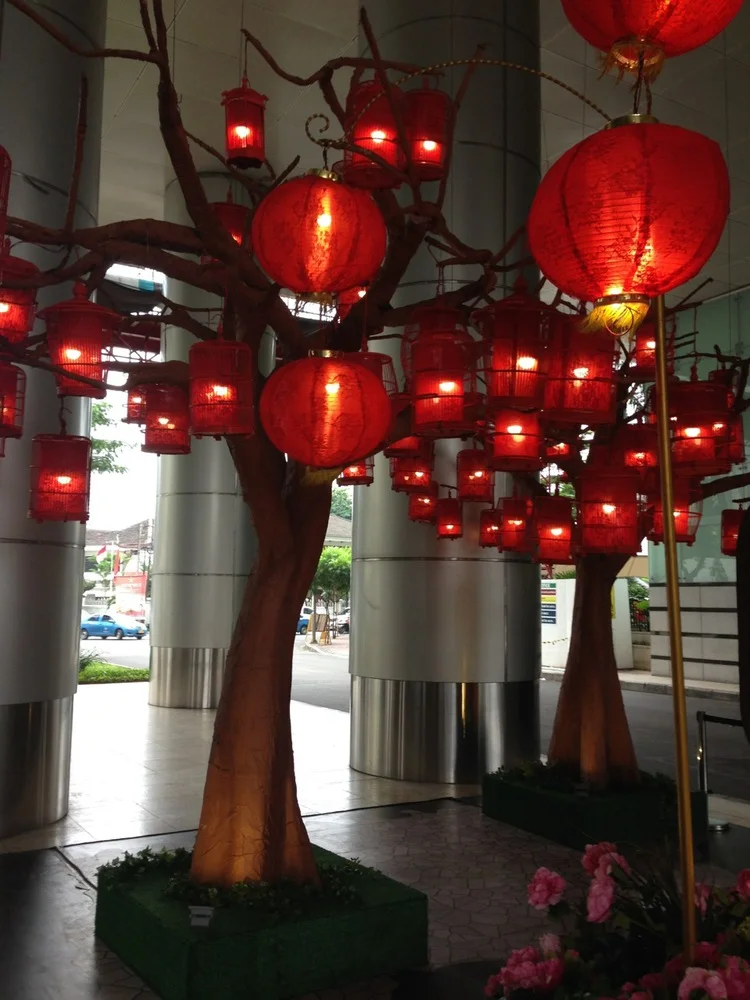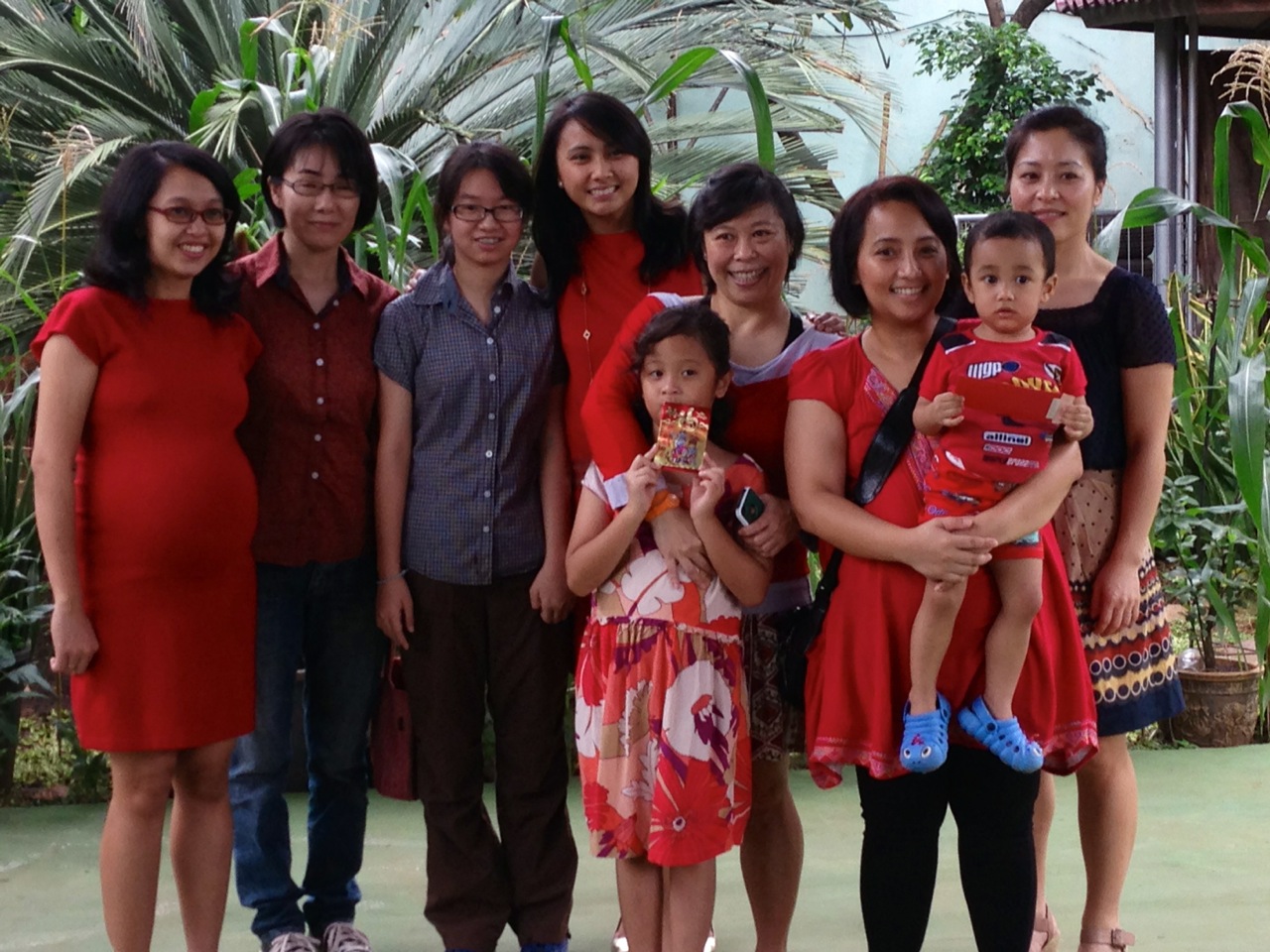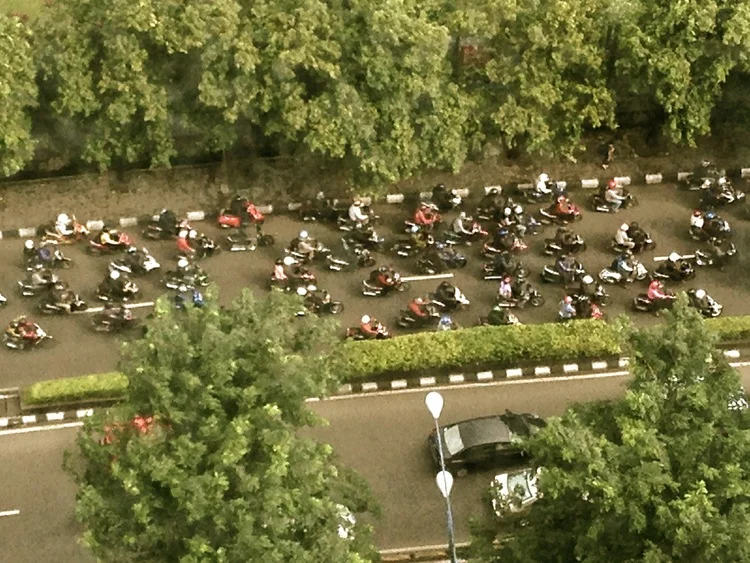Imlek
Lantern tree outside of Grand Indonesia Mall
It's the day before Imlek, or Indonesia's Chinese New Year. Indonesia's malls, major buildings and residences are decked in red. Trains, planes and cars are packed. The migration of people and things and despondent goats resembles a small scale Mudik, the days before Idul Fitri. Woe to the bad planner who has not bought a ticket home. Ode of the riders, who undertake the eight hour motorbike ride out, discretely covered in unclasped helmet, surgical mask, and chest plate. The monotonous slow pace of Indonesia's roadways reminds one of slow moving undulating chains. The personification of persistent drunk ants.
Imlek in Indonesia is a national holiday. Never mind that less than 2% of the population is of Chinese descent, or that 15 years ago, Indonesians from the majority Javanese group targeted Chinese for killing in acts consistent with 70 years of oppression. Indonesians like a celebration. One can say it started with the Dutch. The Dutch in 1830 having conquered Indonesia needed a group large enough to administrate the products of occupation, while small enough to continue the enslavement of the rest. They chose the taller lighter Chinese as functionaries and artisans and conferred to them special protections and privileges. They named them “Foreign Orientals” as distinguished from native “Pribumi”. When the Dutch via Japanese invasion in World War II and their defeat were finally pushed out in 1945, Indonesian Chinese were left to bear the fetid frustration of the newly freed. This dynamic is not unprecedented and most recently seen in Rwanda in 1994 between the minority Tutsi and majority Hutus tribes (Belgium rule 1918-62) and in Iraq in 2003 between the minority Sunni and majority Shia (British rule 1932-58 followed by American invasion 2003). The result: genocide, the cruel realities of survival, and the untenable choices of the ruled.
In coming to work in Indonesia last March, I asked what I might expect from Indonesians as a Taiwanese American. My boss who is white thought that it was a barrier but possibly surmountable. When I asked what Indonesians thought of white Americans, she said that Indonesians appreciated the status that this association conferred. This did not seem fair.
After 11 months of living in Indonesia, I have experienced an alternative cultural reality. I am now privy to what Indonesian’s say out of earshot from non-Asians. This includes utterances like “That guy has been in Indonesia for three years and still can’t speak the language,” or “She is kind of fat even for an Australian,” or “I guess they really like their kids to play sports over study.” In these cases, I am usually trying to eat a beef spare rib with fork and spoon, or at the table listening to the side talk before a meeting.
Pancho and me in Sidoarjo
When in doubt, I turn to my program manager Mia or my office mate Pak Pancho, an obstetrician with substantial international health experience. Mia is frank and honest though sometimes I am forced not to listen to her. “Please do not write your emails in Indonesian!” Mia often complains to me in Indonesian, “Bingun sekali! Saya tidak tahu yang apa Pak Wilson mencoba bilang. Pusing!” -- Confusing! What are you trying to say? Dizzy!
“Mia,” I ask. Her hair is covered in the traditional hijab and she has a matching ornate flowing gown, “watch this movie. I want to know what you think. It’s about the killing of a million people under Suharto in 1965. Filem ini nama ‘Act of Killing’.”
“Ooh, I want to see,” Mia licks her lips.
“I got scared after seeing this movie,” I said, “it made me think that perhaps I don’t know what Indonesians think after all, particularly about the Chinese.”
“They think that they are rich and smart.”
“But what explains the riots in 1998 and the killings in 1965?”
“Dumb and poor people always go after the rich and smart. A lot of people in Indonesia are sadly dumb and poor.”
“Poor yes, but not dumb. No one has ever given me a bad time.”
“You are tall.”
“Benar-benar.”
“There is no reason for people to give you a bad time. You came here to help Indonesia. You are tall. Some would say not bad looking. And besides you can’t understand what they say.”
Pak Pancho is more measured. “I don’t think things in Indonesia proceed this way,” he says furrowing his brow, “I think people judge according to acts and gestures.”
“Anne says that being of Chinese descent is a disadvantage,” I say, “but I feel like it is an advantage. I am Asian! I feel like I have things in common with Indonesians and it is very comfortable for me here.”
“That is great,” Pancho says, “I think your experience is a good guide. White people often think that they are special and they are especially if they think it!” Pancho laughs.
“I can only go with what seems right.”
“That is the only way, Pak.”
* * *
This new year, Seongeun and I are invited to a 4-hour lunch at Husan’s parents house. Husaan’s father Pak Gho founded and still runs a successful steel production and trading business in Kota. Pak Gho is the man who sponsored me to play basketball last fall at the 21st Annual International Chinese basketball tournament in Wuhan China.
“But I am 43,” I told Hasaan when he presented his father’s invitation.
“It’s a tournament only for men and women over forty,” Hasaan laughed.
And indeed it was. The biggest division was actually the fifty to sixty-year-old division. Pak Gho played in the seventy to eight-year-old division. Watching Pak Gho’s team made me appreciate the passion that the game of basketball engenders for young and old while making me regret my lack of adult/geriatric sports injury medical experience. As is custom for men, their bodies degenerate at a much greater rate than white matter synapses recalling former athletic prowess, even greatness. Pak Gho may have just had cardiac surgery last Spring but he sprinted, dove and heaved up just like the rest. It was many things to watch, but aging gracefully was not one of them.
Pak Gho's forty and over basketball team
Pak Gho is at the door with Hasaan and Ibu Gho when Seongeun and I arrive. We half bow to them with smiles on our faces, we thank them for the invitation and we hand them a box of cloth wrapped Korean Pears.
Pak Gho speaks to me in Mandarin, “Ni wei she me zhe yang ze.”
“Why do you do this,” he asks although he is pleased.
The guests come in three waves: family, then company workers, then friends and neighbors. Seongeun and I are honored to have been asked to come at the tail end of the Gho’s family part of the festivities. On the table are two vats of red intestine and clear beef rib soup. There is satay beef, goat and chicken with accompanying dark sweet scallion sauce and gritty orange peanut sauce. There is steamed rice in banana leaves or lengtong, krepik or shrimp chips. There are innumerable oranges scattered along the tables like horizontal ornaments and striped rice based desserts.
At some point, Ibu Gho sneaks me some friend pork bits, “Zhe she guou nian, ya?” It is Chinese new year after all!
I am taken back to a time two years ago when I called my mom and happened to wish her a happy Chinese new year, “It’s called lunar new year,” she snapped, “it is not just the Chinese who celebrate this holiday.”
My mother had taken the Taiwanese Independence movement to an entirely new height: A rewriting of history. “Woe Bessie,” I goaded, “You know that that food processor of yours is made in China.”
“Well I don’t use it.”
“How about some of your clothes, the radio in the kitchen and half the items in the house.”
“I will throw away.”
“You know just because you don’t support the president of Taiwan’s efforts to unify with the mainland doesn’t make all Chinese bad.”
“Thank you for your advice,” she says, my wish on this lunar new years day is for you to keep it to yourself!”
“You are funny Mom.”
“There is nothing funny about the Chinese. They want to take it all.”
It is within the comfort of community and shared heritage and the seriousness of longstanding traditions that we enjoy this particular Indonesian New Year—however referred. Pak Gho makes us welcome by giving us a tour of his Kalimantan filled fish-ponds. Hasan’s cousin’s father shows me to a video game on his smart phone called Clash of Clans that seems overly complicated. I am asked to do a swimmer’s ear medical consult. People admire Seongeun’s Korean-impecable-skin. People guess my age. Later, I am reunited with my Wuhan basketball team and we take pictures, out comes the beer, and more surreptitious pork.
Young women at Pak Gho's party







